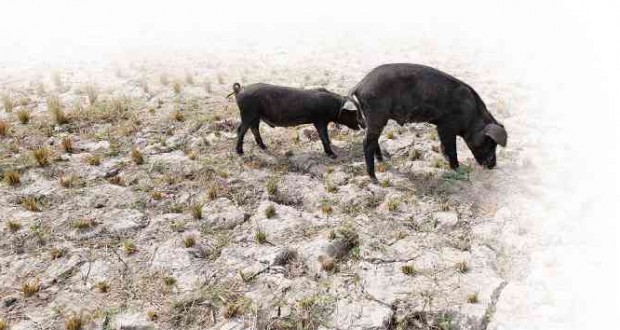LGUs told climate change funds now P2B

PIGS roam a rice farm destroyed by the dry spell in North Upi town, Maguindanao province. JEOFFREY MAITEM/INQUIRER MINDANAO
DAVAO CITY—The government now has up to P2 billion in funds that communities suffering from El Niño could use to cope with the disastrous effects of the weather phenomenon associated with climate change, according to the head of a government agency that oversees projects to soften the impact of climate change.
Emmanuel de Guzman, head of the Climate Change Commission (CCC), said local governments should also start preparing “risk- and science-based” approaches in dealing with climate change and warned that bigger disasters as a result of climate change were yet to happen.
De Guzman also told the Inquirer that local governments exposed to climate change risks could access the People’s Survival Fund (PSF), which has now grown to P2 billion since it was created in 2013. The PSF, De Guzman said, will receive an annual allocation of P1 billion as provided for by the Climate Change Act and its amending law, Republic Act No. 10174.
In a statement, the Department of Agriculture (DA) said many Mindanao provinces were bearing the brunt of El Niño, with at least 17,000 hectares of rice and corn farms destroyed in the provinces of Maguindanao, North Cotabato and South Cotabato.
Central Mindanao, which includes the two Cotabato provinces, already suffered P639 million in crop losses, according to the DA.
Article continues after this advertisementCrop destruction in Southern Mindanao, the DA said, has already hit P358 million.
Article continues after this advertisement“Failure to prepare for and implement programs on climate change adaptation and mitigation projects and disaster risk reduction and management programs may lead to more devastating disasters in the country,” De Guzman said.
In a bid for stronger cooperation among communities at risk, the CCC rolled out the Communities for Resilience (Core) project to be implemented in 18 major river basins in the country.
These are the Mindanao River, Tagum-Libuganon, Davao, Buayan-Malungon, Tagoloan, Cagayan de Oro, Agusan and Ranao (Agus) river basins in Mindanao; Ilog-Hilabangan, Panay and Jalaur river basins in the Visayas; and Pasig-Laguna, Pampanga, Agno, Abra, Cagayan, Bicol and Apayao-Abulug river basins in Luzon.
The CCC, in cooperation with the United States Agency for International Development, launched the Core project here to press the Mindanao local governments to start working together for climate resiliency.
De Guzman said that though the Philippines had one of the lowest greenhouse gas emissions globally, it was leading other countries worldwide in efforts to institute climate change policies because “we are the first victims of climate disasters.”
De Guzman said the Philippines would be one of the first countries to sign the Paris agreement in April 2016 in New York that would push for a 1.5-degree-Celsius cap on global warming. Ma. Cecilia Rodriguez, Inquirer Mindanao